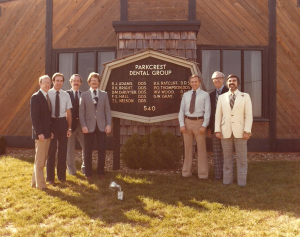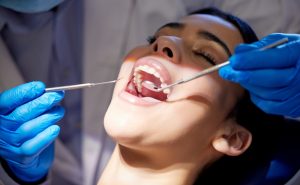Do you live in an area that’s prone to hard water? If you’re finding a chalky build up in your water-based appliances, you probably do — but you probably haven’t thought about what it would do to your teeth. At Parkcrest Dental Group, our team of dental professionals see all kinds of long-term issues from the things we eat and drink, but the effects of hard water are much lesser known than the usual sugary sodas and junk food.
In this blog, the Parkcrest Dental Group takes a look at how hard water impacts your teeth, and what you can do to prevent damage and avoid cosmetic dentistry.
Related Post: Common Acidic Foods That Damage Your Teeth
What is hard water?
You’ve probably heard the phrases “hard water” and “soft water” a few times, usually with the former being linked to dire horror stories about clogged pipes and ruined laundry. But what exactly do these labels mean? Put simply, hard water is water with high mineral content.
Calcium and magnesium will both accumulate throughout the water cycle, and the more there is of both, then the “harder” the water is due to its mineral content. Soft water is, by contrast, water with less buildup. You can usually tell whether you have hard or soft water coming out of your faucet by looking for a white, chalky residue around it, in your sink, or in appliances like kettles and coffee makers.
What are the side effects of hard water on teeth?
Before you panic about your suddenly sinister tap water, the Parkcrest Dental Group team wants to reassure you that, overall, hard water is safe to drink. There is a lot of debate as to whether or not there are any long-term side effects from drinking hard water, such as kidney stones or even Alzheimer’s, but there is currently no concrete evidence.
The main physical effects you’ll notice from extremely hard water are dry skin from washing or hands or showering, and a sometimes-bitter tang. The downsides of hard water are usually easily solved with a simple water filter that you can attach to faucets and showerheads.
Related Post: Pediatric Dentistry: Why Drinking Water Is Key To A Healthy Smile
Does hard water damage teeth?
While there’s no solid evidence that hard water can cause serious health issues, you’d think that ingesting mineral-heavy hard water would have an effect on your teeth through direct exposure. We all know that calcium has a benefit on your teeth, as well as your overall health, and increasing your intake isn’t going to hurt.
But what about hard water being abrasive? Is it likely to damage your teeth? For the most part, the minerals in hard water tend not to be abrasive enough to damage your teeth or their enamel. Using a store-bought water filter will help to cut down on the buildup of mineral deposits in your appliances, but you don’t need to worry about the condition of your teeth.
Like any medical professionals, the Parkcrest Dental Group can’t recommend drinking water throughout the day enough.
Where can I get more preventative care tips?
If you’re already suffering the side effects of hard water, or you’re looking for general dentistry and cosmetic dentistry services, the Parkcrest Dental Group is waiting to hear from you. With years of experience, we seek to make you comfortable and confident about your visit. Contact your local dentist in Springfield, MO, today. Or call Parkcrest Dental Group at 417-887-1220.





